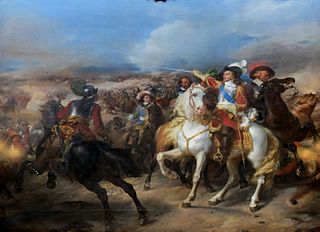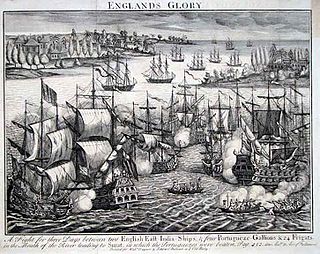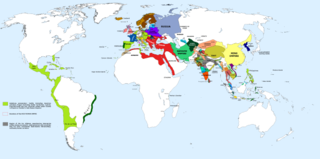Related Research Articles

1648 (MDCXLVIII) was a leap year starting on Wednesday of the Gregorian calendar and a leap year starting on Saturday of the Julian calendar, the 1648th year of the Common Era (CE) and Anno Domini (AD) designations, the 648th year of the 2nd millennium, the 48th year of the 17th century, and the 9th year of the 1640s decade. As of the start of 1648, the Gregorian calendar was 10 days ahead of the Julian calendar, which remained in localized use until 1923.

1662 (MDCLXII) was a common year starting on Sunday of the Gregorian calendar and a common year starting on Wednesday of the Julian calendar, the 1662nd year of the Common Era (CE) and Anno Domini (AD) designations, the 662nd year of the 2nd millennium, the 62nd year of the 17th century, and the 3rd year of the 1660s decade. As of the start of 1662, the Gregorian calendar was 10 days ahead of the Julian calendar, which remained in localized use until 1923.
The 1540s decade ran from 1 January 1540, to 31 December 1549.

1691 (MDCXCI) was a common year starting on Monday of the Gregorian calendar and a common year starting on Thursday of the Julian calendar, the 1691st year of the Common Era (CE) and Anno Domini (AD) designations, the 691st year of the 2nd millennium, the 91st year of the 17th century, and the 2nd year of the 1690s decade. As of the start of 1691, the Gregorian calendar was 10 days ahead of the Julian calendar, which remained in localized use until 1923.

1680 (MDCLXXX) was a leap year starting on Monday of the Gregorian calendar and a leap year starting on Thursday of the Julian calendar, the 1680th year of the Common Era (CE) and Anno Domini (AD) designations, the 680th year of the 2nd millennium, the 80th year of the 17th century, and the 1st year of the 1680s decade. As of the start of 1680, the Gregorian calendar was 10 days ahead of the Julian calendar, which remained in localized use until 1923.

Year 1554 (MDLIV) was a common year starting on Monday of the Julian calendar.

1612 (MDCXII) was a leap year starting on Sunday of the Gregorian calendar and a leap year starting on Wednesday of the Julian calendar, the 1612th year of the Common Era (CE) and Anno Domini (AD) designations, the 612th year of the 2nd millennium, the 12th year of the 17th century, and the 3rd year of the 1610s decade. As of the start of 1612, the Gregorian calendar was 10 days ahead of the Julian calendar, which remained in localized use until 1923.

1585 (MDLXXXV) was a common year starting on Tuesday of the Gregorian calendar and a common year starting on Friday of the Julian calendar, the 1585th year of the Common Era (CE) and Anno Domini (AD) designations, the 585th year of the 2nd millennium, the 85th year of the 16th century, and the 6th year of the 1580s decade. As of the start of 1585, the Gregorian calendar was 10 days ahead of the Julian calendar, which remained in localized use until 1923.

Year 1536 (MDXXXVI) was a leap year starting on Saturday of the Julian calendar.

The 1550s decade ran from January 1, 1550, to December 31, 1559.
The 1670s decade ran from January 1, 1670, to December 31, 1679.

Year 1576 (MDLXXVI) was a leap year starting on Sunday of the Julian calendar.

1660 (MDCLX) was a leap year starting on Thursday of the Gregorian calendar and a leap year starting on Sunday of the Julian calendar, the 1660th year of the Common Era (CE) and Anno Domini (AD) designations, the 660th year of the 2nd millennium, the 60th year of the 17th century, and the 1st year of the 1660s decade. As of the start of 1660, the Gregorian calendar was 10 days ahead of the Julian calendar, which remained in localized use until 1923.

1672 (MDCLXXII) was a leap year starting on Friday of the Gregorian calendar and a leap year starting on Monday of the Julian calendar, the 1672nd year of the Common Era (CE) and Anno Domini (AD) designations, the 672nd year of the 2nd millennium, the 72nd year of the 17th century, and the 3rd year of the 1670s decade. As of the start of 1672, the Gregorian calendar was 10 days ahead of the Julian calendar, which remained in localized use until 1923.

Year 1562 (MDLXII) was a common year starting on Thursday of the Julian calendar.

Year 1552 (MDLII) was a leap year starting on Friday of the Julian calendar.

The naval Battle of Swally, also known as Battle of Suvali, took place on 29–30 November 1612 off the coast of Suvali a village near the Surat city and was a victory for four English East India Company galleons over four Portuguese galleons and 26 barks.
Events from the year 1671 in England.
Events from the year 1680 in England.
Events from the 1560s in England.
References
- ↑ "Lists and Indexes, Issue 47 p93: Public Record Office > New York; Kraus Reprint Corporation; 1963
- ↑ Cobbett's Parliamentary history of England, from the Norman Conquest in 1066 to the year 1803 (London: Thomas Hansard, 1808)
- ↑ "HASELRIGGE, John (d.1612), of Leicestershire". History of Parliament Online. Retrieved 18 June 2020.